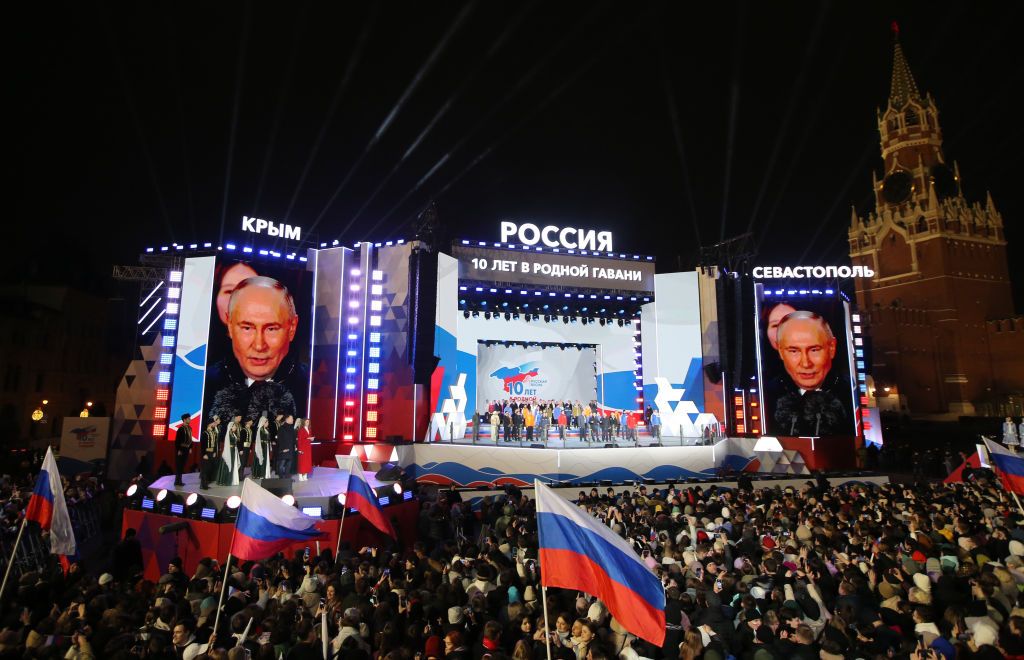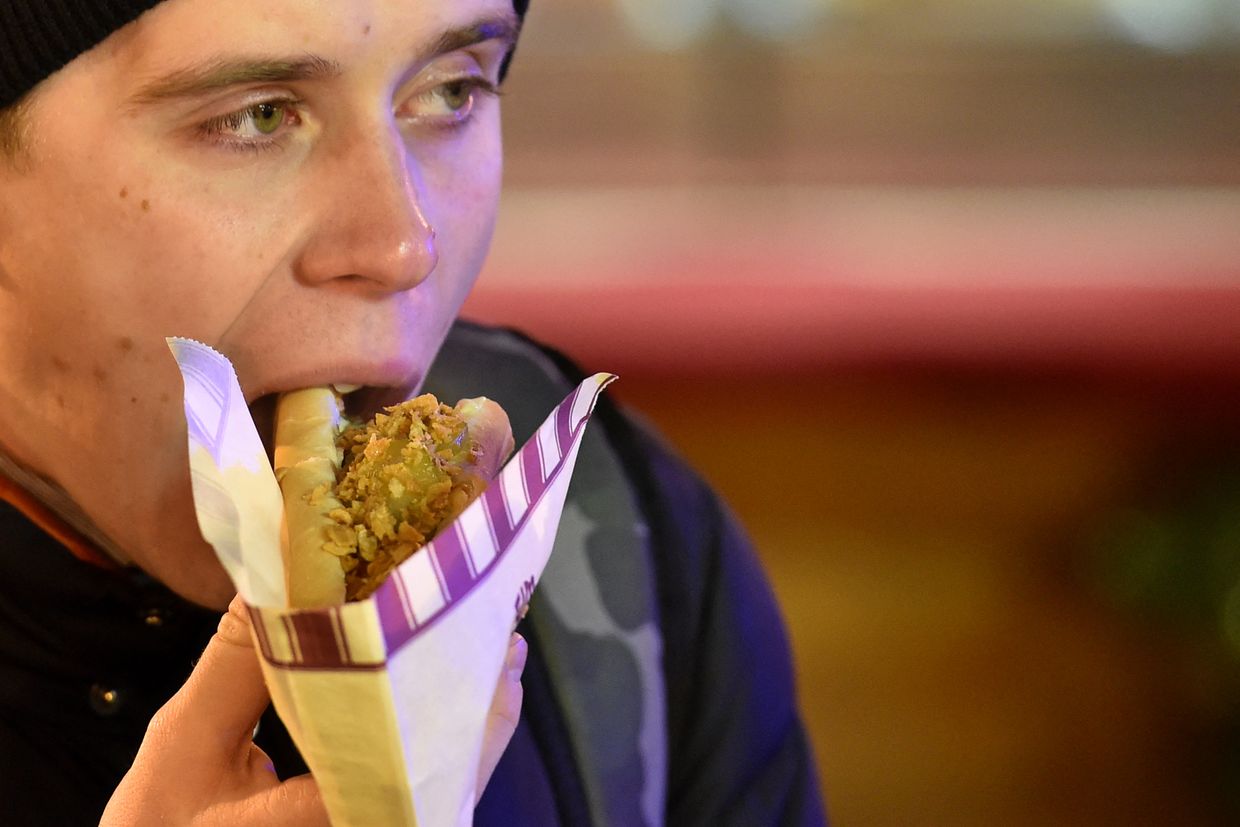Western leaders denounce Putin's election 'victory,' fall short of refusing to recognize results

Russian President Vladimir Putin leaves during his press conference at his campaign headquarters, early March, 18, 2024, in Moscow, Russia. (Contributor/Getty Images)
Russian President Vladimir Putin easily cruised to victory in an election ruled neither free nor fair, solidifying his grip on power for another six years.
Russia's Central Election Commission awarded Putin with 87.2% of the vote in an election that was widely seen as tightly controlled and without the participation of any meaningful opposition.
Western leaders have characterized the vote as fundamentally unfair. Yet, they have stopped short of officially declaring that they will not recognize the results, and Putin as president.
While saying there was "nothing free or fair" about the election, U.S. National Security Advisor Jake Sullivan stopped short of saying it was illegitimate.
The choice of words was intentional.
“The reality is that President Putin is the president of Russia, and we've had to deal with that reality throughout the war in Ukraine, during other aggressions by Russia, during other moves that are against U.S. national interests that we've seen from this president of the Russian Federation," Sullivan added.
Speaking the day before the election began, U.S. State Department spokesperson Matthew Miller said, "The United States does not and will never recognize the legitimacy or outcome of these sham elections held in sovereign Ukraine as part of Russia's presidential elections."
Miller was referring to voting that took place, literally at gunpoint at times, on Ukrainian territory illegally annexed by Russia.
Josep Borrell, the EU's top diplomat, said that voting on Ukrainian territory was "null and void" and that the election organizers "will face consequences of these illegal actions."
It's currently unknown what consequences would Russian officials face.

The previous Russian presidential election in 2018, which Putin won handily, also included voting in the illegally annexed Ukrainian territory of Crimea. Then U.S. President Donald Trump called Putin after to congratulate him on the results.
And while, this time around, Putin would have to settle for a smaller support group, Indian Prime Minister Narendra Modi, and Turkish President Recep Tayyip Erdogan didn't shy away from congratulating the Russian president.
Chinese President Xi Jinping also sent his congratulations, while West's arsenal to punish Putin for his war against Ukraine, occupation of the country's territories, and conducting a sham vote at gunpoint remains limited.
High hopes, little results
Following the blatantly rigged 2020 Belarusian election that handed dictator Alexander Lukashenko another term in the presidential office, EU and U.S. officials, said they would not consider Lukashenko to be the legitimately elected leader.
Many have urged the West do the same with Putin.
Jailed Russian dissident Vladimir Kara-Murza wrote an op-ed for the Washington Post arguing that the West should declare Putin to be illegitimate and the election illegal.
Kara-Murza cited the government's crackdown on free press, the inability of meaningful opposition candidates to participate, and rules set out in Russia's own constitution as key reasons to explicitly not recognize Putin's reelection.
Yet, there are also crucial differences between the regimes of Lukashenko and Venezuelan President Nicolas Maduro, who is also viewed as illegitimate by the U.S., and Putin.
Both Belarus and Venezuela have opposition figures – Sviatlana Tsikhanouskaya and Juan Guaido, respectively – who were recognized by some countries as legitimate leaders and have a base of support.
While neither leader has so far been able to actually take the reins, they presented an alternate possibility that does not exist in Russia.

Following the death of Alexei Navalny in February, the Russian opposition is fractured and largely leaderless.
The U.S. could declare that the Russian election was illegitimate and insist on new voting to be held openly under international observation, but there is no opposition figure waiting in the wings to emerge as even a representative of the government in exile like Tsikhanouskaya.
Despite the heavily managed election, polls conducted in July 2023 by the Levada Center, a Russian independent polling organization, found that almost 70% of respondents wanted Putin to be reelected. Another Levada Center poll released in February 2024 found that 77% of respondents supported the full-scale war in Ukraine.
While accurate polling information in Russia is difficult to obtain due to the clampdown on public expression and the possibility of real consequences for dissent, numerous media reports have illustrated that a majority of Russians still support Putin.
Even as the West delivers punishing sanctions against Russia and supplies increasingly advanced weapons to Ukraine, there is a hesitance to fully isolate Russia and commit to its defeat.
French President Emmanuel Macron raised eyebrows and drew quick rebuttals from other Western partners when he suggested in February that he would not rule out troops being sent to Ukraine.
Alongside the small group of autocratic leaders aligned with Russia that congratulated Putin on his electoral "victory" were leaders of India, China and Turkey, countries holding substantial economic and political power.
The Russian state-run media outlet RIA Novosti, citing church leader Leonid Sevastyonov, claimed that Pope Francis congratulated Putin as well, but the assertion was not supported elsewhere.
In a congratulatory message on Twitter, Modi said, "(I) look forward to working together to further strengthen the time-tested special & privileged strategic partnership between India and Russia in the years to come."

Was there a point?
Beyond failing to attract important players like India and Turkey, there is also the question of what the practical implications would actually be if the West decided to declare Putin an illegitimate leader.
Despite the declarations of their illegitimacy, Lukashenko remains in power in Belarus, and Maduro is set to run essentially unopposed in a presidential election scheduled for July 2024.
Venezuela's opposition removed Guaido as head of the interim government in December 2022, largely because it "had lost faith in (his) ability to oust Maduro."
The decision to declare Putin's reelection illegitimate could also lead to accusations that the West ignores electoral rigging when it is convenient.
Labeling Putin as an illegitimate president may have symbolic value and be an accurate reflection of the unfair circumstances in which the election was held. But as long as the West treats Putin as the leader of Russia, rhetorical choices will likely have little practical impact.













